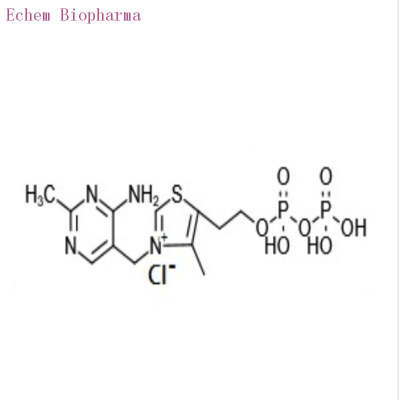-
Categories
-
Pharmaceutical Intermediates
-
Active Pharmaceutical Ingredients
-
Food Additives
- Industrial Coatings
- Agrochemicals
- Dyes and Pigments
- Surfactant
- Flavors and Fragrances
- Chemical Reagents
- Catalyst and Auxiliary
- Natural Products
- Inorganic Chemistry
-
Organic Chemistry
-
Biochemical Engineering
- Analytical Chemistry
- Cosmetic Ingredient
-
Pharmaceutical Intermediates
Promotion
ECHEMI Mall
Wholesale
Weekly Price
Exhibition
News
-
Trade Service
Professor Shen Yu of Peking University Law School
The modernization of the food safety governance system and governance capacity is a long-term and arduous undertaking, involving many important issues in the four dimensions of system, technology, resources and personnel, especially the institutional dimension, because it directly determines how the strictest standards, the strictest supervision, the most severe penalties and the most serious accountability can be effectively realized
As a food safety governance tool, "negative disclosure" often occurs in cases of "failure", for example, the regulatory authorities notify a company with food safety problems, and many consumers cannot receive this notification in a timely and accurate manner
The function of negative disclosure
The negative disclosure referred to in this article is not a term that has already appeared in existing laws, but refers to a situation in which an administrative organ takes information disclosure measures and the content of the disclosure may adversely affect
"Negative" is in terms of the objective effect of information disclosure, and refers to the possibility of adverse effects on a particular administrative counterpart, whether the adverse effect will actually occur, and if so, how large the scope of the adverse effect depends on a number of factors
Public Knowledge Administrative authorities carry out information disclosure, whether or not there is any other purpose, the purpose and functional expectation of making the public informed are always there
In the field of food safety, regulators find that there are safety risks or hidden dangers in the production and operation process of food producers and operators or the food they produce and operate in the process of daily supervision, which may harm the health of the public, and publish relevant information
Promote rectification Food safety regulators who discover food safety risks or hidden dangers, or determine that food producers and traders have illegal situations, in addition to making decisions such as warnings, fines, and orders corrections according to different situations, can also create public opinion pressure or the public to carefully choose the consumption environment for purchasing relevant foods through information disclosure, thus forcing food producers and operators to correct
Food safety regulators believe that food producers and traders have violations of laws and regulations, and through warnings, fines, orders to rectify and other measures are still not enough to avoid the recurrence of their old state, but the order to stop production and business, revoke the license is too severe, then the regulator can increase the sanctions through negative disclosure, so that it can withstand market pressure for a long period of time to increase adverse consequences
Conditions of effect of negative disclosure
Although the regulatory purposes and functional expectations for the use of negative disclosure are different, if the disclosure information does contain negative evaluations of food producers and operators or the food they produce and operate, it is objectively likely to cause adverse reputations to producers, operators or related foods, and further cause them to bear economic disadvantages
Information is authoritatively released People or organizations with specialized knowledge or professional experience in the field of food, as well as media (including self-media) with a high reputation in the field of information dissemination, generally have a certain authority
Information is easy to understand and persuasive Food safety-related information is often based on science, involving scientific experiments, data, conclusions, and scientific expressions
At present, the biggest problem encountered by negative disclosure is that although the information is released, it may not be able to reach the public
Information is effective in terms of pertinence, for example, a certain tea chain store is fined and notified for illegal operation in the production process, if the negative disclosure only mentions the stores of the chain enterprise involved, it is obvious that it only affects the store itself, and will not have a decisive impact on
Whether the information recipient has a normal psychological and behavioral orientation of seeking benefits and avoiding harm is a decisive factor
Rule of law construction for negative disclosure
The role of negative disclosure is actually a process
In view of this, negative disclosure also needs to strengthen the construction
Strict Authorization The requirement
for who has the right to make a negative disclosure cannot be relaxed because the negative disclosure does not have any legal rights and obligations to the administrative counterpart.
If any internal organ of the supervisory authority, a sending agency or even any staff member can "raise the flag", it is undoubtedly more likely to lead to the abuse
of power.
Determining the conditions of application Sometimes, negative disclosures play a role as an alternative, so the failure of other regulatory instruments is a prerequisite for their application
.
In any case, the conditions for application are determined, and such norms should not be provided by laws, regulations, rules and other stable legislation, but should be provided by other normative documents; Its nature should be a discretionary benchmark, requiring some flexibility and flexibility in application and modification
.
Regulating procedures Since negative disclosures will, after all, have a de facto adverse effect on the market interests of the parties concerned, it is still necessary to follow a basic hearing procedure externally – unless public health risks are imminent and hearings delay the best warning time; If the possible adverse effects are greater, the legality review procedure and the collective decision procedure should be followed internally
.
Accept judicial review Within the framework of China's administrative litigation system, factual acts made by administrative organs infringe upon the lawful rights and interests of prosecutors
are actionable.
However, the negative disclosure is combined with the public's market choice behavior, and adversely affects the market interests of the food producers and operators involved
.
As a governance tool, negative disclosure will inevitably lead to disputes
.
There is no good reason to exclude such disputes from the court's scope of cases
.
Liability for Compensation If the negative disclosure is wrong or improper, causing the food producers and traders involved to bear unnecessary losses of benefits, if the victim files a request for administrative compensation, the regulator who made the negative disclosure shall compensate for the losses
in accordance with the State Compensation Law.
The usual economic rationality of the public makes it extremely likely that it will make the market behavior expected by the regulator to make a negative disclosure, so in most cases, the considerable causal relationship between the negative disclosure and the result of the damage is established, and the constituent elements of liability are satisfied
.
Of course, food safety regulators should not be afraid of administrative litigation and state compensation without using negative disclosures
.
The existence of judicial review availability and the redressability of rights and interests damages only allows regulators to cautiously make negative disclosures
in accordance with the law.
Under normal circumstances, as long as the information is true, the legislation authorizes the regulator to release the information, and the regulator follows the necessary procedures, it is completely possible to achieve the effect of
food safety governance without triggering administrative litigation or even if there is an administrative lawsuit, it will not lose the lawsuit and will not bear the unfounded state compensation liability.
China Food News (2022-09-16 03 edition)
(Editor-in-charge: Zhou Yan)







